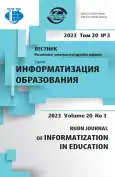Teaching artificial intelligence in secondary school: from development to practice
- Авторлар: Levchenko I.V.1, Sadykova A.R.1, Kartashova L.I.1, Merenkova P.A.1
-
Мекемелер:
- Moscow City University
- Шығарылым: Том 20, № 3 (2023)
- Беттер: 265-280
- Бөлім: TEACHING COMPUTER SCIENCE
- URL: https://journal-vniispk.ru/2312-8631/article/view/321263
- DOI: https://doi.org/10.22363/2312-8631-2023-20-3-265-280
- EDN: https://elibrary.ru/EGZWEM
- ID: 321263
Дәйексөз келтіру
Толық мәтін
Аннотация
Problem statement . Currently, various global and national institutions promote mainstreaming artificial intelligence (AI) technology into training programs for school students. The effectiveness of introducing artificial intelligence into school curricula depends on four factors: 1) defining methodological foundations for creating educational content; 2) selecting and structuring appropriate learning content; 3) adapting the content to the needs of different age groups; 4) integrating the content into school programs. The current study provides theoretical foundations for generating learning content for AI lessons aimed at secondary school students and determines possible ways of integrating that content into school programs. Methodology. The empirical part of the study involved 225 secondary school students aged 11-14 (forms 5 to 9) as well as 125 teachers from comprehensive schools located in Moscow and the Moscow region. Analysis, synthesis, testing and sampling average methods were used. Results. The authors conducted a pilot testing of the developed educational materials, measured students’ AI-related skill and knowledge and processed the obtained data using the method of selective averages. The theoretical research conducted showed the leadership of artificial intelligence training in primary schools, mechanisms for developing learning outcomes in the field of artificial intelligence for primary school students, the opportunity to reveal the possibility of forming the content of artificial intelligence training based on various approaches. The goals and results of teaching the basics of artificial intelligence within the framework of basic school were determined. The content of training was formulated. Conclusion. The research is characterized by scientific and practical novelty, as it helps determine methodological grounds for teaching AI to secondary school students and proposes a detailed unit plan for an AI training course in secondary school.
Негізгі сөздер
Авторлар туралы
Irina Levchenko
Moscow City University
Хат алмасуға жауапты Автор.
Email: levchenkoiv@mgpu.ru
ORCID iD: 0000-0002-1388-4269
Doctor of Pedagogical Sciences, Professor of the Department of Informa- tics, Management and Technology
28 Sheremetievskaya St, Moscow, 129594, Russia FederationAlbina Sadykova
Moscow City University
Email: sadykovaar@mgpu.ru
ORCID iD: 0000-0002-1413-200X
Doctor of Pedagogical Sciences, Professor of the Department of Informatics, Management and Technology
28 Sheremetievskaya St, Moscow, 129594, Russia FederationLyudmila Kartashova
Moscow City University
Email: kartashovali@mgpu.ru
ORCID iD: 0000-0002-9499-9083
Candidate of Pedagogical Sciences, Associate Professor of the Department of Informatics, Management and Technology
28 Sheremetievskaya St, Moscow, 129594, Russia FederationPolina Merenkova
Moscow City University
Email: kukhtinapa@mgpu.ru
ORCID iD: 0000-0003-4774-8668
senior lecturer, Department of Computer Science, Management and Technology
28 Sheremetievskaya St, Moscow, 129594, Russia FederationӘдебиет тізімі
- Dukhanina LN, Maksimenko AA. Problems of implementation of artificial intelligence in education. Prospects for Science and Education. 2020;(4): 23-35. (In Russ.) https://doi.org/10.32744/pse.2020.4.2
- Bosova LL. Modern development of school informatics in Russia and abroad. Informatics and Education. 2019;(1):22-32. (In Russ.) https://doi.org/10.32517/0234-0453-2019-34-1-22-32
- Murphy RF. Artificial intelligence applications to support K-12 teachers and teaching: a review of promising applications, challenges, and risks. Santa Monica, CA: RAND Corporation; 2019. https://doi.org/10.7249/PE315
- Peng L, Xiaohong S. Predictions for the Potential development of artificial intelligence in Chinese education. ICIEI 2018: Proceedings of the 3rd International Conference on Information and Education Innovations, June 30th - July 2nd 2018, London (pp. 26-29). London: ACM; 2018. https://doi.org/10.1145/3234825.3234839
- Sperling А, Lickerman D. Integrating AI and machine learning in software engineering course for high school students. ITiCSE '12: Proceedings of the 17th ACM Annual Conference on Innovation and Technology in Computer Science Education, July 3rd - July 5th 2012, Haifa (pp. 244-249). New York: ACM; 2012. https://doi.org/10.1145/2325296.2325354
- Merenkova PA. Global experiences in introducing artificial intelligence into school education. In: Alekseeva OS, Grigorenko MM, Kirevnina EI, Novikova TS. (eds.) Proceedings of the XXXI International Conference “Modern Information Technologies in Education” (pp. 21-23). Moscow, Troitsk: Trovant Publ. (In Russ.)
- Levchenko IV. The main approaches to teaching the elements of artificial intelligence in the school course of computer science. Informatics and Education. 2019;(6):7-15. (In Russ.) https://doi.org/10.32517/0234-0453-2019-34-6-7-15
- Levchenko IV. Conceptual framework for teaching schoolchildren the basics of artificial intelligence. In: Abushkin DB, Volovikov SA, Zaslavskaya OYu, Pavlova AE, Ponomareva LA, Mamedova VA, Ushakov AV. (eds.) Mathematics and Information Technology in Education and Business. Moscow; 2020. p. 320-325. (In Russ.)
- Kartashova LI, Levchenko IV. Methods of teaching information technology to primary school students in the context of fundamental education. Bulletin of the Moscow City University. Series: Informatics and Informatization of Education. 2014;(2):25-33. (In Russ.)
- Grigoriev SG, Grinshkun VV, Levchenko IV, Zaslavskaya OYu. A draft project for a computer science program in a secondary school. Informatics and Education. 2011;(9):2-11. (In Russ.)
- Levchenko IV. Formation of IT competencies in teaching artificial intelligence to school-children. Proceedings of the XIII International Scientific Conference “Shamovskiye Pedagogical Readings”. Moscow; 2021. Pp. 390-384. (In Russ.)
- Kondratieva VA. Teaching Python programming in a school computer science course. Bulletin of the Moscow City University. Series: Informatics and Informatization of Education. 2021;(1):8-16. (In Russ.) https://doi.org/10.25688/2072-9014.2021.55.1.01
- Kalinin IA, Samylkina NN. Computer science. Moscow: BINOM. Laboratoriya Znanii Publ.; 2013. (In Russ.)
- Yasnitskiy LN. Artificial intelligence. Elective course. Moscow: BINOM. Laboratoriya Znanii Publ.; 2012. (In Russ.)
Қосымша файлдар









